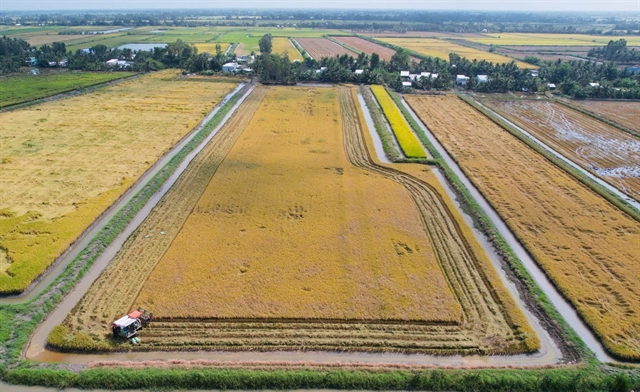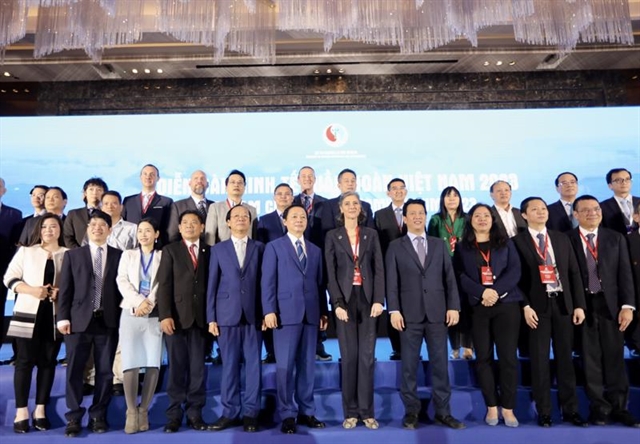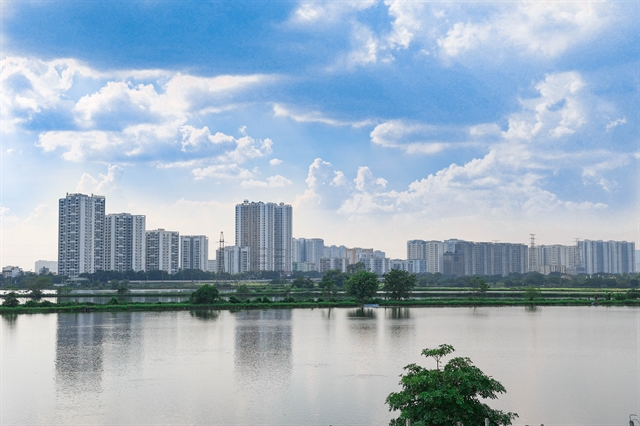 Economy
Economy


|
| Participants at the Việt Nam Circular Economy Forum 2023 held in Hà Nội on Thursday. Photo vneconomy.vn |
HÀ NỘI – Specific policies will serve as a launching pad for enterprises and industrial parks to promote circular business practices in the most effective way, Deputy Prime Minister Trần Hồng Hà said on Thursday.
At the Việt Nam Circular Economy Forum 2023 held in Hà Nội by the Ministry of Natural Resources and Environment in collaboration with the United Nations Development Programme (UNDP), Hà stressed that besides a specific plan with detailed targets and a consensus from the society, a legal corridor is needed to shape circular economy models which involve the responsibilities of all sectors.
The State must play a central role in creating policies and frameworks that facilitate sustainable practices, enterprises being the locomotive, and organisations and individuals engaging in efforts to bolster the circular economy, he highlighted.
Laying emphasis on building a national action plan to carry out the circular economy, Minister of Natural Resources and Environment Đặng Quốc Khánh said that the plan will provide specific strategies, both long and short term, for the country to shift to the circular economy towards sustainable development.
Over the past time, environmental and climate issues have been put at the centre of the country’s agendas and development plan, setting a goal of ensuring people’s health, quality of the living environment, and protection of bio-diversity and ecosystem, he added.
Deputy Minister of Natural Resources and Environment, Võ Tuấn Nhân said: “Developing a circular economy is a key solution to innovate the economic model, improve growth quality and national competitiveness, ensure sustainable production and consumption, and contribute to harmoniously resolving the relationship between economics and the environment.”
He said the 2030 Agenda for Sustainable Development, adopted by all United Nations members in 2015, sets out a common plan for peace and prosperity for people and the planet in present and future, calling for urgent action by all countries to protect the environment and address climate change issues, towards a carbon-neutral, zero-emission economy by 2050.
The initiatives on green economy, low carbon economy and circular economy are efforts of the international community to respond to the challenges of resource depletion, degradation and environmental pollution, as the impacts of climate change are increasing, threatening sustainable development, he added.
“In particular, the circular economy is being evaluated by the international community as an appropriate and practical approach to help humanity solve current challenges and achieve sustainable development goals,” he said.
Notably, the circular economy is an economic model that aims to effectively use and save resources and recycle waste, contributing to both environmental protection and economic efficiency. This is considered a green solution for a sustainable economy, one of the world's important tasks.
The deputy minister said that for nearly 40 years, development based on natural resources and cheap labour has helped Việt Nam make many achievements in socio-economic development. However, like other countries, Việt Nam is now facing the serious challenges of resource depletion, pollution, environmental degradation and climate change.
Faced with these issues, the Party and State have had quite timely guidelines and policies with the support of international organisations. Việt Nam is actively researching and institutionalising goals for the development of circular economy in the legal system and practice to solve the issues.
In particular, the Law on Environmental Protection 2020 defines circular economy as "an economic model in which design, production, consumption and service activities aim to minimise the exploitation of raw materials, prolong product life, limit waste and eliminate negative impacts on the environment.” The Law also assigns responsibilities to ministries, ministerial-level agencies, provincial-level People's Committees, and the business community in implementing circular economy.
Along with that, Decree 08/2022/NĐ-CP dated January 10, 2022 of the Government has detailed regulations on a number of articles of the Law on Environmental Protection and instructions on criteria and measures, responsibilities, roadmap and incentive mechanisms for implementing circular economy.
“The circular economy can only become a reality with the participation of all levels, sectors, business community and people. In addition, the support of the international community is very important,” he said.
The Deputy Minister wished to continue to receive the sharing of experience, knowledge and suggestions for Việt Nam to promote the transition to a circular economy in the context of many changes in the world.
He also called on the Vietnamese business community to actively participate and contribute responsibly to realise circular economy, green economy, and low-carbon economic initiatives, contributing to achieving the goals of sustainable development by 2030.
On the sidelines of the forum, UNDP Resident Representative Ramla Khalidi said the organisation believes building a sustainable, inclusive and prosperous world by 2030 is not only necessary but also feasible.
By shifting to a low-carbon economy and circular economy, Việt Nam is able to lead and orient its development roadmap to attain sustainable development goals, she said, adding that the country should invest in three strategic groups, namely better design for circular economy, acceleration of digital economy, and improvement of human capital.
Pioneering in Việt Nam with the initiative to build a circular economy in plastic waste management through the public-private partnership (PPC) model, Unilever has co-operated with the Ministry of Natural Resources and Environment and other partners to implement the project, helping classify at the source, collect and recycle plastic waste.
“Within three years, our PPC project has collected and recycled 25,000 tonnes of plastic waste to serve daily life. Manufacturers like Unilever will use these recycled plastic pellets to produce new plastic bottles. Distributors such as retailers will bring products with recycled plastic packaging to consumers, and encourage consumers to continue classifying plastic waste after use, so that the cycle of plastic continues,” said Nguyễn Thị Bích Vân, Chairwoman of Unilever Việt Nam.
“In economic terms, we are losing nearly 70 per cent of the value of plastic materials, equivalent to nearly US$3 billion a year. At the same time, we release plastic waste into the environment and pollute the living environment of the community,” she added.
To solve this problem, Việt Nam must redirect the flow of plastic in a circular direction and return it to serve human life instead of being thrown away, she said.
Meanwhile, the President and CEO of Thailand’s Siam Cement Group said with a national action plan to implement the circular economy, more Vietnamese enterprises will apply the Environment, Society and Governance (ESG) standards, adding his group are expecting to cooperate with Vietnamese partners to promote the circular economy with a view to enhancing the ASEAN bloc’s competitive capacity in the international market.
At the forum, domestic and international development partners discussed a draft national action plan for the circular economy and an implementation roadmap. They highlighted that financial mechanisms such as carbon market development and innovative financing for biodiversity and ecosystem services as well as the mobilisation of the private sector in sewage management are important resources to implement the circular economy in the coming time.
Within the framework of the forum, 20 booths were arranged introducing models and solutions promoting the circular economy towards environmental protection and sustainable development. VNS




